Informal group Ženski solidarni front formed spontaneously when a group of motivated women felt the need and obligation to respond to the effects of the pandemic their local community in Vranje suffered. They gathered around the idea to organize a grand charity ball and bazaar in order to raise money for children whose parents had died of COVID-19.
The initiative gathered a number of successful women from Vranje and was supported by the Center for Media Transparency and Social Responsibility (CMTDO). As a result, in just two weeks and with the support of the community, by 20 August, a total of RSD 600,000 was raised (5.000 EUR) and 26 direct donations were provided to help the children who had lost one or both parents since the beginning of the pandemic.
In addition to this large initiative in August, the charitable women of Vranje helped their community throughout the pandemic year of 2020 by raising around RSD 3 million (25.500 EUR) for the support to the healthcare system, with the assistance of good and responsible fellow citizens.
Milica Anđelković Jovanović, who wanted to help the children of Vranje and activate her community, made only one Facebook status and launched a chain of support engaging hundreds of women who wanted to contribute to the humanitarian initiative. Today, this informal group has more than 700 members, including several men who have joined recently, since the fact that membership was exclusive to women was criticized by men in the beginning, as Milica points out.
In the interview, Milica talks about the power of community in the circumstances which caught us all completely unprepared. She told us about their motives to get together and help children and families, about obstacles they had to face, and about how one Charity Ball in August 2021 united the citizens of Vranje in common cause.
How was informal group Ženski solidarni front established? What was the initial idea and how did your mission take shape?
Milica: The group developed quite spontaneously, as all beautiful things do. One day, I was sitting in this very place, at work, thinking about it, because I myself had lost my dad to Covid-19 which I took very hard and would not have been able to get over it if I hadn’t had the support of the community – not material support, but the support of people around me: friends, acquaintances, colleagues from work. I was sitting there thinking: How hard it must be for them, who are 5, 8, 12 or 15 years old, to lose someone in such a way.
It’s not just about losing your mom or dad, but about losing a working member of the family – someone who earned and put food on the table and who was gone in two weeks. We did not want to say that this was material support because it sounded a bit underrating and demeaning – our idea focused more on actual support.
This was our first, and possibly clumsy, step in showing those children and families who had lost a family member that they were not alone, that they had a community. Vranje is a poor city, one of the poorest in Serbia, just like the entire Pčinja County, in general. What I could do at first was to try to invite women I knew, who were strong and successful, or maybe not so successful but willing to help. I wanted to see if I could form a group that could do something.
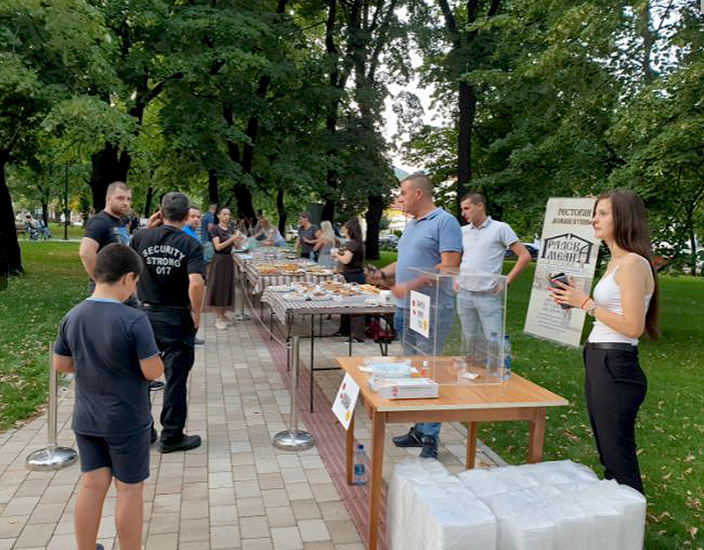
Last year, we also raised funds to support the COVID system in Vranje. In two weeks, we raised around RSD 3 million, both in money and in goods. We donated everything to Vranje healthcare system and organizations that take care of people in social need, such as shelters for adults and the elderly, and so on.
I posted a status on Facebook and women started responding – my friends, acquaintances, women who knew me from around, and they all said: We’re in! The next step was that (Facebook) group where we could communicate both formally and informally, schedule meetings, share information and this spontaneously took a more serious shape. On the day of the Ball, Ženski solidarni front had over 600 members and it is still alive. Today, it has over 700 members, and we’ve recently started accepting men, since the fact that membership was exclusive to women was criticized by men in the beginning (laughs).
On the other hand, Vranje is a patriarchal community where there are still rules about a woman’s place and role, and what she should and can do. In this way, we wanted to show that women know their place very well – that it is not just to cook and take care of children, but that women can move and shake things, animate an entire community for the sake of social good.
When did the group form? What motivated you to start? Tell us more about your members. Who actually forms Ženski solidarni front?
Milica: One of the beautiful things about Ženski solidarni front is that it gathered women of various backgrounds, levels of education, age, etc. We have university professors, housewives, women who finished high school, officers working for the United Nations, doctors, lawyers, judges, etc. It was literally a chain reaction: everyone called everyone they knew and thought could help. This was how we formed a very heterogeneous group, which, on the other hand, is homogeneous in terms of the idea that guided and moved us forward.
The women that are the heart of Ženski solidarni front have long been pursuing their respective careers. This includes me, who works for the UN. I have a colleague who is a journalist, a colleague who is a psychologist, and one who is a doctor: it was the four of us who were at the heart of this initiative, and we realized that we couldn’t achieve much without the support of the local government and City authorities.
We soon scheduled a meeting with the Mayor and Deputy Mayor who had already known us, and everything took its course. We received unconditional support, and what amazed me the most was that none of the people who were there politically wanted to promote politics. Even the Mayor, when we talked about the Ball as the main event, said he did not want to make a speech and that he would attend only as an ordinary citizen with his wife, because he did not want to cause any resentment around the event and Ženski solidarni front. We had their support from start to finish in terms of the logistics and providing the city park as the place to hold the Ball, and even later when we announced the public call.
The first meeting was held in mid-June, while we had three meetings of Ženski solidarni front at the Great Hall of the City Hall, which was another logistical support of the City. The meeting was open to all women who wanted to come, but we limited the number to 40 due to the epidemiological measures. During those three meetings, we had to be fast, direct, concise, and to clearly assign tasks, obligations and responsibilities. In those three meetings, we basically managed to organize everything, face to face. Things were largely organized over the phone or social media. So, our members are all women who thought they could in any way help raise as many funds as possible to support the children who lost their parents to the virus.
How long did it take you to organize the entire event?
Milica: The action lasted for two months, and it was two months of chaos, because we all had jobs, and it was challenging to fit the Ball, which was important to all of us, with our jobs, families, children and friends. That was the hardest part – to organize a ball, because nothing like that had ever happened in Vranje before. We talked to some people from the local government, and one of them told us: Are you aware of what you have done for Vranje? Are you aware of what a huge bite you’ve taken?
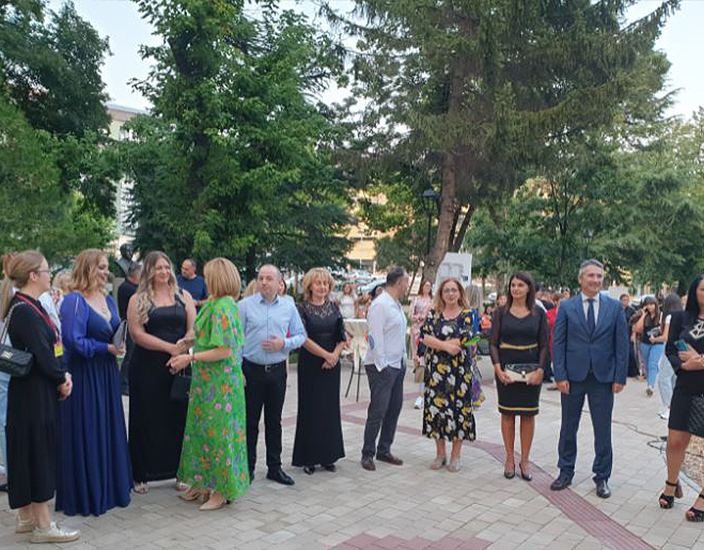
It took us two months to organize the Ball, lobby communities, animate companies, private business owners and individuals. We did most of it owing to our personal connections, because everyone contacted who they knew.
How did you start providing assistance to children who lost their parents during the pandemic?
Milica: It was the first form of support, and maybe it was a little clumsy, but it was a start. We wanted to use the Ball to draw the attention of decision-makers that it is necessary to develop other mechanisms of assistance – not just to children who lost parents, but also to families who lost members, jobs, as well as in terms of people’s mental health which has truly been affected by the situation.
It was also an attempt to demonstrate what can and should be done, and that everyone needs help. We won’t be able to tackle the effects on the pandemic on our own, and community is something that is the closest to us. Our neighbors, our friends – these are the people we rely on when something good or bad happens, and why should it be any different now, when this tremendous scourge befell the whole world.
Tell us about last year’s COVID initiative.
Milica: Ženski solidarni front existed last year as well, only it wasn’t called that way. In all that chaos with the pandemic, we didn’t even have a name. Again, we had the support of the Center for Media Transparency and Social Responsibility, which last year lent us their special purpose account to collect funds. We came to a point where we had to do something. At the time, another friend of mine died of Covid, so to sit and wait for anyone else to die was not an option.
Then we started thinking who would be willing to help us. The good things is that we have a lot of people working outside Vranje, in Belgrade, Novi Sad and outside Serbia, so they were the ones who provided the greatest support during the COVID fundraising initiative for the support to the healthcare system, but there were also some companies from Serbia that had seen our call. For example, a company from Babušnica that sells uniforms, pajamas and bed sheets donated those materials and helped the system in that way.
It was different last year – it was faster, more urgent and required less logistics. We had to act in the moment, because COVID hospitals had virtually nothing. It was different, but we saw that it was possible. We saw the power of a united community and how we can make a huge change. There were restaurants that, at their own initiative, made dinners for the staff of four COVID hospitals in Vranje. It was their own idea, one restaurant owner engaged another, and so on. For nearly two months, they cooked dinners for everyone working in COVID hospitals. This year, during the Ball and humanitarian action, they were also there for us making food – traditional specialties of Vranje that we sold at the Ball. It all came together – from one story, we leaped into another, only in a greater, different and more organized way.
The result of last year’s COVID initiative was that we raised around RSD 3 million, both in money and in goods, including masks, gloves, bed sheets, pillow cases, mattresses, alcohol, etc. It may not be much, but at that moment, it was a lot. We used all our physical and material resources, as well as the resources of everyone involved in the initiative.
No one found it hard to donate, not during the COVID initiative, not now. I find it particularly fascinating that some women competed in who would animate more, raise more funds or think of a better idea for what else we could give for the Ball. People only needed a slight push, someone to organize them a bit, nothing else was needed.
What was always a priority in our work was that there was no politics involved. Negative energy was not allowed, no one could have defeatist attitudes, because they would immediately get excluded. During those two months, we only had love and good energy. I cannot explain to you that everyone in Vranje breathed as one for two months. We lived and breathed together. For instance, if a woman in this initiative was a director of a company in Vranje, the whole company stood by her. The National University, the School of Animated Film from Vranje, the Music School and many others joined. Women who headed entire institutions got involved and thus everyone gave a piece of themselves.
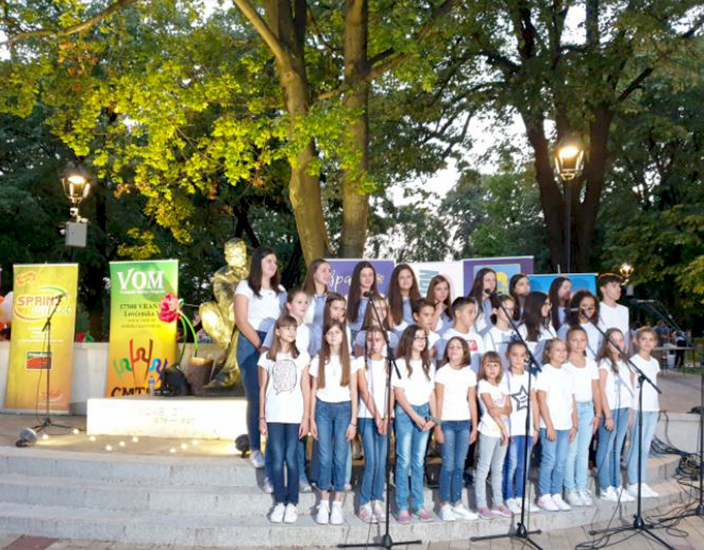
I still live off this energy, and believe me, when everything was finished, when emotions settled, 10–15 days after the Ball, we were all so tired. Right before the Ball, I fell and sprained my knee, so I walked on crutches getting things done. Some people even saw us as a new political force, as someone who could become a political contender in the future. But we started this out of pure solidarity, altruism and love. I’m a mother and a child who lost a parent during the pandemic – that was my driving force, not an interest in politics or getting a job. Politics was involved in this project only in the sense that it was a wind in our sails, but not individually and not as a whole.
Why was it important for you to help the community precisely in that segment?
Milica: I myself have lost my father, and even after 10 months, I’m still in shock. It all happened so fast and so suddenly, I literally wasn’t aware that it happened until it was all over. I was 42 at the time. I was well-situated, professionally and personally accomplished and I could barely get myself together. And what it must be like for someone who is 10 years old and has lost their mom or dad in that way!
This was our way to show to those children and mothers that they are not alone and that there is no shame in asking for help. There were women who felt uncomfortable applying. That is why we didn’t want to make a database of people who had died of COVID and look for families in that way, because that additional stigma was not welcome, so we just let everyone apply themselves. The public call was open for three weeks, it was in all media, social media, and everyone who wanted to apply could do it.
Do you cooperate with other associations and in what way?
Milica: We have to bear in mind the fact that the civil sector is not strong in Vranje, I know that because I had worked in that sector before I got a job at the UN. Funds are scarce, it is becoming more difficult to get funds, and everything that is donated usually goes to organizations that are close to the centers of power. Therefore, the civil sector in Vranje is very weak. The existing attempts are – I would say – more politically motivated. I was not surprised, and we didn’t need much help. I believe that, if we had asked some organizations for help directly, they would have supported the entire thing. But we had so many hands and brains, both female and male, so we had it all covered.
Who are your supporters and how did you establish cooperation with them?
Milica: We reached out to many companies operating in the territory of Serbia that are known for being socially responsible. However, none of them came to our aid. Some of them didn’t even reply to our emails, and others clearly showed us that they didn’t even read the email, and it seemed as if they only wanted to get us off their backs. On one hand, I was really sorry, but on the other, it was a good thing, because it woke up some sort of spite in us: If you won’t help us, we can do it on our own. One of the greatest things is that everything was organized and supported solely with the funds of the community and owing to the people living in Vranje.
Those who responded to our call were private individuals working in the territory of Vranje. Those were also local companies, including Alfa, a local company from Vranje, and Knauf, which has a factory in Surdulica. We know them, and based on our personal connections we got their support. Others were individuals and companies operating in the city – supermarkets, clothing stores, small family factories, etc. But that was literally 500 individuals.
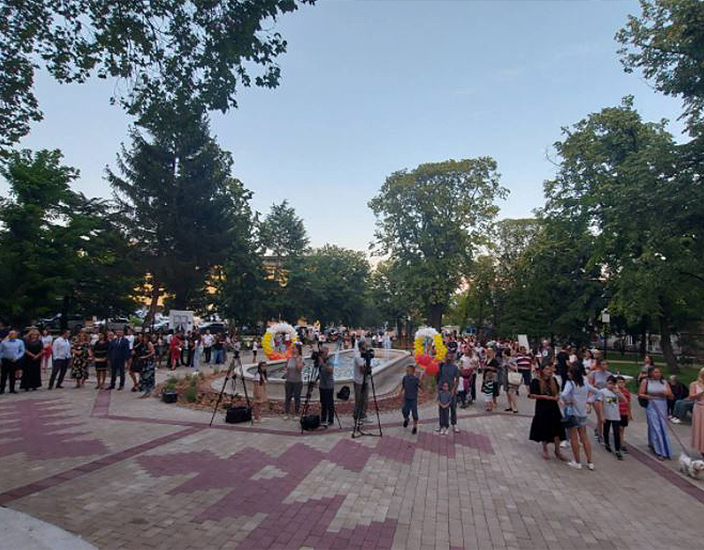
Every woman used her own connections to increase the number of supporters. Some women even went from one clothing store to another and presented our story to the owners and workers, explaining the benefits the city and children would have. We literally went from door to door and collected donations, a no one from the local government said No. We must take into account the fact that it was vacation time, and that many companies wanted to support us but they were on collective vacation.
Women who donated their clothes, which was high-quality but worn and which we sold during the Ball, we also considered as donors. It was one way of assistance and contribution. Basically, everyone gave what they had. For example, my father-in-law who is a beekeeper donated 5 kg of honey that we sold during the Ball. People found ways to help and there were a lot of service providers that joined. For instance, hair and beauty salons, cake shops, etc. All those small entrepreneurs got involved, responded to our call and gave what they could.
How do you get the funds for your work? Which types of donors do you cooperate with and in what way? How can we all support your work?
Milica: We had two types of contributions. The first was collecting items for sale at the Ball. The second type were payments to the special purpose account, which the Center for Media Transparency and Social Responsibility lent us. They were also with us when we organized the COVID initiative, because we know each other and because we are friends sharing the same values and aspirations. They immediately came to our aid and did significant work regarding administration and logistics, which was very important. They got involved directly, but the call was open to everyone; however, somehow, no other organization working at the territory of the city particularly engaged in giving their own contribution.
We are an informal group and we gathered spontaneously to support the children who had lost their parents during the pandemic. We thought our work would be done once the Ball and the public call were over. However, we suddenly realized: Why should we end such a wonderful thing, even more so because there was great energy and women got together – which is particularly important given women’s vanity. To me as a graduate sociologist, it was really interesting to follow the relations between those women and see whether vanity would prevail or whether altruism and desire to help would win.
And truly, vanity was set aside. We had such beautiful energy, and when all that was over, we realized it would be a shame to put an end to it. Ženski solidarni front is currently asleep, so it is not dead, only sleeping. We already have some ideas how we could support vulnerable groups in our city and community, but all in good time. Everything that we did regarding the Ball and the initiative was on a volunteer basis. We even gave our own funds and we would do it again, because the feeling we got in return is invaluable. There is no money in the world that can pay the feeling that we did something truly grand and truly good.
Which activities are currently in your main focus?
Milica: The day we organized the Ball, 20 August, was the 43rd anniversary of Diana Budisavljević’s death. We all know who she was, but Vranje did not know who Diana was. So we decided to combine this date with our Ball and commemorate her. Therefore, on 20 August, Vranje became the first city in Serbia to get a public landmark in honor of this great heroine. We got a 45 m2 mural in the center of the city, portraying her. This was done at our initiative, as the day marked the 43rd anniversary of her death. Therefore, on the same day, we got the first mural in Serbia dedicated to Diana Budisavljević, to honor this woman who had been unfairly forgotten.
And the most beautiful thing for me was that we brought Ms Jelena Buhač Radojčić to the unveiling of the mural. She is one of the children Diana Budisavljević saved from Jasenovac. Ms Jelena is 87, and when we contacted her through the Serbian National Council in Croatia, she immediately said: Yes, I’m coming, it finally happened that someone remembered and honored her, and I am glad that I will be there to thank her, because she saved me and my brothers from Jasenovac.
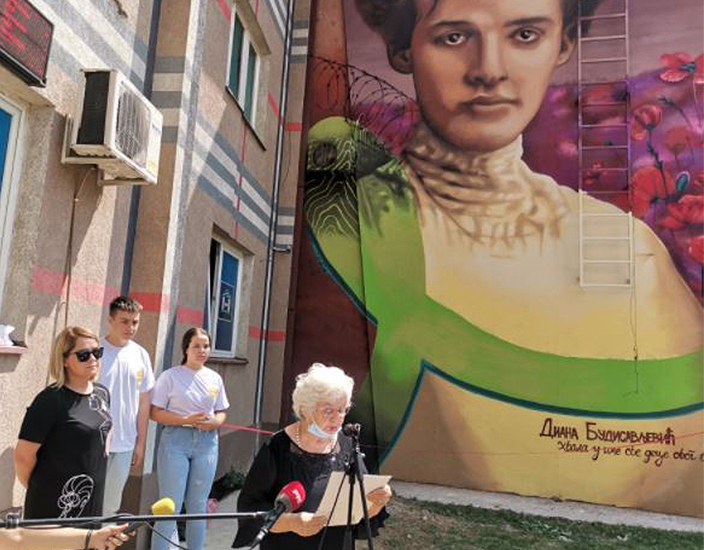
In this way, we teach a good lesson – on one hand, we promote solidarity and humanitarianism, because in these times of individualism as the primary value to pursue we forgot about solidarity which is the greatest legacy of civilization. This is the first thing we demonstrated with this Ball, and the second thing is that 99 % of the people in Vranje did not know who Diana Budisavljević was when I asked them. I think that a huge historical injustice was done to this woman, to her sacrifice and anti-fascist struggle. I think the fact that her mural stands in the center of Vranje, near Vranje High School, near the place where youth gathers, is an excellent way to give them a lesson about Diana, her work and values she promoted. If only one student pauses in front of the mural and wonders who this woman is, and then googles and sees who she really was – our mission is complete.
What are the main goals you plan to achieve in the future?
Milica: We’ve had several ideas and initiatives, but, unfortunately, Covid is still ongoing. We’ve lost a few women who were the core of Ženski solidarni front due to their personal losses, so we had to simmer down a bit.
We’re still wrapping up the initiative. After the Ball, we talked with each family. First, we announced a public call for families who lost a member, so – children who lost their mother or father. A total of 19 families with 30 children applied, of which there were 18 single mothers and one single father. Each family had an individual meeting with a three-member committee for the purpose of needs assessment. At the moment, we have to deliver wood to one or two more families, and thus finish our story about the Ball and support to children and families who lost members.
The emotions surrounding those individual meetings and provision of support were a story for itself. I intentionally excluded myself from all that, since I couldn’t bear it because of my own story. My colleagues who were involved would literally go speechless.
The meetings were organized after the Ball, to decide on the distribution of funds. We raised over RSD 600,000 in money, and we had 26 direct donations from 26 companies and individuals who wanted to donate their goods or services to the families. These included dentist services for children who lost their parent, donated furniture, etc. This was something special for Vranje. The Ball itself was organized with 0 dinars, and it all came down to contributions – restaurants made food, Aleksić winery gave us wine, supermarkets gave us juices and water, women made cakes, a colleague’s mother from Preševo made baklava, etc.
Another thing was that over 30 artists from Vranje responded to our call. They sent their works to be sold at the Ball, and the most expensive item was EUR 500, which is truly extraordinary for the time and society we live in. Artists demonstrated unbelievable solidarity. During those two months, we were guided by democratic principles – everyone had the right to express their opinion and be heard, everyone had a task and the right to say something, as well as the obligation to fulfill the task they undertook. Everything was transparent, which I am most proud of. We also had a huge media support, both at the local level and beyond, again owing to the local media and the people who knew journalists working for national media. So, there was RTS that followed our work, as well as TV Prva, Večernje novosti and so on.
Do you plan to organize more activities aimed at tackling the effects of the pandemic?
Milica: I think the pandemic affects children and families, but I also think our elderly citizens are equally affected, in terms of finance, small pensions, diseases or disabilities, loneliness. So, we already have an idea cooking in our minds regarding a new activity where we would like to support our elderly citizens.
Now that the Charity Ball is over, we know how physically and mentally demanding that is, so we are very careful in terms of when and what we are going to launch. On the other hand, we’ve had some personal losses, so we are waiting for things to settle a bit, but all in its good time.
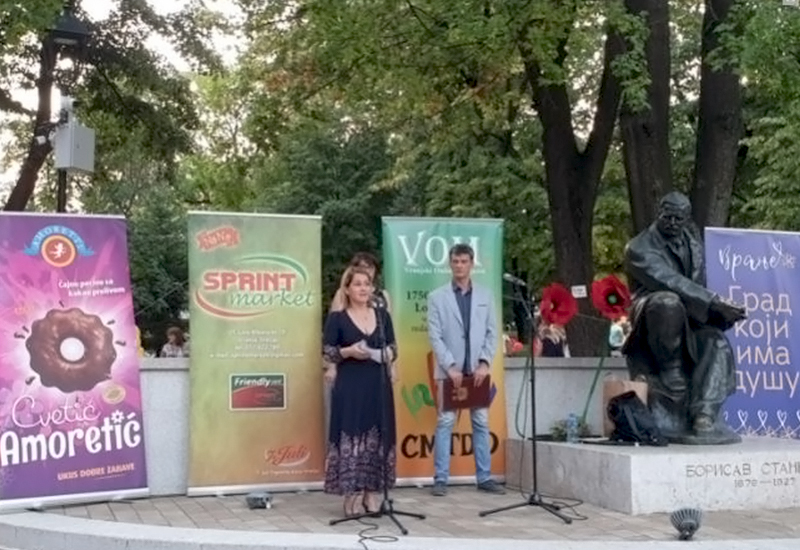

Leave a comment